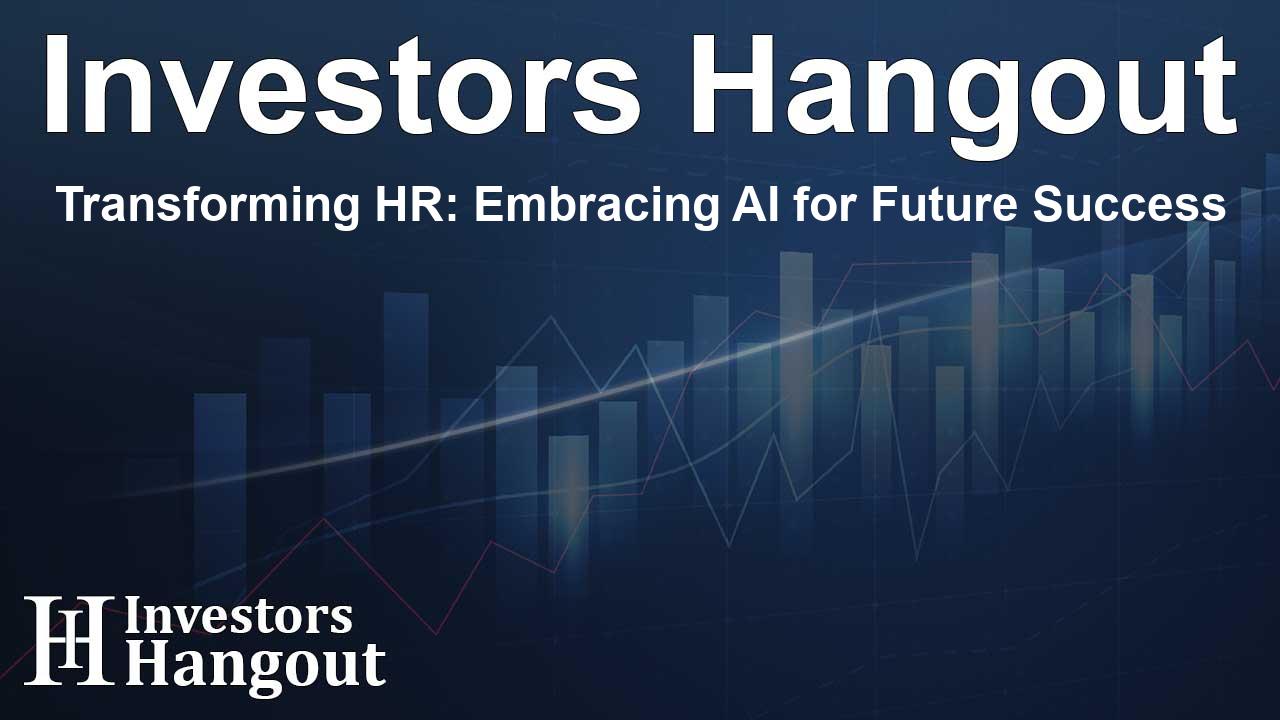Transforming HR: Embracing AI for Future Success
Human resources (HR) professionals stand at a crucial crossroads. An opportunity is emerging for them to reignite their roles as strategic enablers within organizations eager to harness the power of artificial intelligence (AI).
The Role of HR in AI Integration
As detailed in a recent report, the importance of HR in navigating the challenges posed by AI cannot be overstated. Organizations are increasingly realizing that human-centric strategies are essential in successfully adopting AI technologies. Yet, as the report notes, significant barriers still hinder HR's ability to lead this vital transformation.
Survey Insights
This report stems from a comprehensive survey of HR professionals and business leaders, providing a clear look at the existing gap in understanding and integration of AI within HR practices. A striking 91% of those surveyed affirmed that having the right talent is fundamental for AI success; however, 72% voiced concerns about the already existing skills gaps being exacerbated by AI's rise. In particular, only 21% reported that their HR departments have a seat at the table when discussing organizational AI strategies.
Key Challenges Identified
Addressing the challenges HR faces in adopting AI involves an acknowledgment of the significant gaps noted in the survey respondents. Firstly, a remarkable 52% view the lack of AI expertise within HR as their most pressing hurdle. Furthermore, only 35% feel their teams are adequately equipped to upskill their workforce in line with the demands of AI integration.
The Shift Toward Talent Development
To close these gaps, organizations must prioritize new training initiatives aimed at AI-related skill development. Encouragingly, 54% of the respondents confirmed that they are focusing on enhancing employee skill development in this area. The emphasis is not only on technical capabilities but also on softer skills such as creative problem-solving, which are increasingly valued by leaders as they navigate the complexities of AI integration.
The Changing Profile of HR Professionals
The report sheds light on the evolving nature of HR professionals in the age of AI. Moving beyond traditional HR roles, today’s leaders must cultivate a range of competencies:
- Data-Driven Decision Making: Effective use of data for strategic workforce planning is paramount.
- Change Management: Guiding employees through the changes brought about by AI technology is essential.
- Continuous Adaptability: HR must embrace ongoing learning about new AI technologies and support their teams in doing so.
Rethinking Talent Strategies for AI
The findings necessitate a shift in talent acquisition and development strategies. Traditional role-centric approaches—the focus on filling specific job descriptions—must evolve into a skills-based model. This strategy emphasizes critical competencies that align with AI's trajectory and prepares employees for the rapid changes in job requirements within the workforce.
Ultimately, the goal of these insights is clear: HR professionals have an unprecedented chance to step forward as leaders in the AI journey of their organizations. By overcoming existing barriers and leveraging their unique position, they can transform their departments into essential drivers of innovation and success.
Frequently Asked Questions
What key challenges do HR professionals face with AI integration?
HR professionals encounter challenges like a lack of AI expertise, skills gaps, and limited involvement in shaping AI strategies within organizations.
How can HR leaders leverage AI effectively?
HR leaders can leverage AI by prioritizing upskilling and reskilling initiatives and fostering adaptability among their workforce.
Why is talent development crucial in the context of AI?
Talent development is crucial because the success of AI initiatives heavily relies on having skilled workers who can adapt to new technologies and roles.
What competencies should HR professionals focus on in the AI era?
HR professionals should focus on data-driven decision-making, change management skills, and continuous adaptability to remain effective.
How should HR strategies evolve to accommodate AI?
HR strategies should shift from role-centric hiring to skills-based approaches that align with the needs of an evolving AI landscape.
About The Author
Contact Caleb Price privately here. Or send an email with ATTN: Caleb Price as the subject to contact@investorshangout.com.
About Investors Hangout
Investors Hangout is a leading online stock forum for financial discussion and learning, offering a wide range of free tools and resources. It draws in traders of all levels, who exchange market knowledge, investigate trading tactics, and keep an eye on industry developments in real time. Featuring financial articles, stock message boards, quotes, charts, company profiles, and live news updates. Through cooperative learning and a wealth of informational resources, it helps users from novices creating their first portfolios to experts honing their techniques. Join Investors Hangout today: https://investorshangout.com/
The content of this article is based on factual, publicly available information and does not represent legal, financial, or investment advice. Investors Hangout does not offer financial advice, and the author is not a licensed financial advisor. Consult a qualified advisor before making any financial or investment decisions based on this article. This article should not be considered advice to purchase, sell, or hold any securities or other investments. If any of the material provided here is inaccurate, please contact us for corrections.

